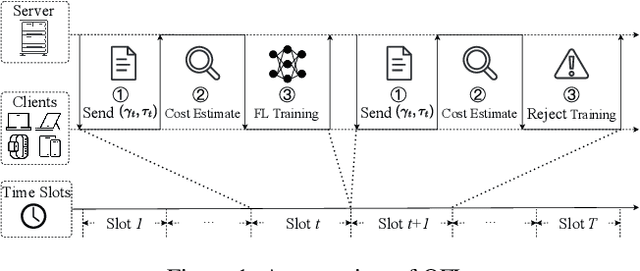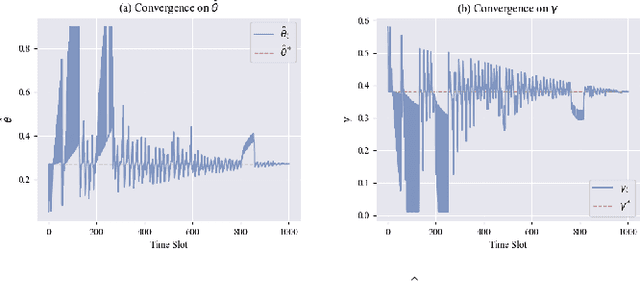Shuqin Cao
DaringFed: A Dynamic Bayesian Persuasion Pricing for Online Federated Learning under Two-sided Incomplete Information
May 09, 2025



Abstract:Online Federated Learning (OFL) is a real-time learning paradigm that sequentially executes parameter aggregation immediately for each random arriving client. To motivate clients to participate in OFL, it is crucial to offer appropriate incentives to offset the training resource consumption. However, the design of incentive mechanisms in OFL is constrained by the dynamic variability of Two-sided Incomplete Information (TII) concerning resources, where the server is unaware of the clients' dynamically changing computational resources, while clients lack knowledge of the real-time communication resources allocated by the server. To incentivize clients to participate in training by offering dynamic rewards to each arriving client, we design a novel Dynamic Bayesian persuasion pricing for online Federated learning (DaringFed) under TII. Specifically, we begin by formulating the interaction between the server and clients as a dynamic signaling and pricing allocation problem within a Bayesian persuasion game, and then demonstrate the existence of a unique Bayesian persuasion Nash equilibrium. By deriving the optimal design of DaringFed under one-sided incomplete information, we further analyze the approximate optimal design of DaringFed with a specific bound under TII. Finally, extensive evaluation conducted on real datasets demonstrate that DaringFed optimizes accuracy and converges speed by 16.99%, while experiments with synthetic datasets validate the convergence of estimate unknown values and the effectiveness of DaringFed in improving the server's utility by up to 12.6%.
FedCross: Intertemporal Federated Learning Under Evolutionary Games
Dec 22, 2024



Abstract:Federated Learning (FL) mitigates privacy leakage in decentralized machine learning by allowing multiple clients to train collaboratively locally. However, dynamic mobile networks with high mobility, intermittent connectivity, and bandwidth limitation severely hinder model updates to the cloud server. Although previous studies have typically addressed user mobility issue through task reassignment or predictive modeling, frequent migrations may result in high communication overhead. Overcoming this obstacle involves not only dealing with resource constraints, but also finding ways to mitigate the challenges posed by user migrations. We therefore propose an intertemporal incentive framework, FedCross, which ensures the continuity of FL tasks by migrating interrupted training tasks to feasible mobile devices. Specifically, FedCross comprises two distinct stages. In Stage 1, we address the task allocation problem across regions under resource constraints by employing a multi-objective migration algorithm to quantify the optimal task receivers. Moreover, we adopt evolutionary game theory to capture the dynamic decision-making of users, forecasting the evolution of user proportions across different regions to mitigate frequent migrations. In Stage 2, we utilize a procurement auction mechanism to allocate rewards among base stations, ensuring that those providing high-quality models receive optimal compensation. This approach incentivizes sustained user participation, thereby ensuring the overall feasibility of FedCross. Finally, experimental results validate the theoretical soundness of FedCross and demonstrate its significant reduction in communication overhead.
TRAIL: Trust-Aware Client Scheduling for Semi-Decentralized Federated Learning
Dec 17, 2024


Abstract:Due to the sensitivity of data, federated learning (FL) is employed to enable distributed machine learning while safeguarding data privacy and accommodating the requirements of various devices. However, in the context of semi-decentralized federated learning (SD-FL), clients' communication and training states are dynamic. This variability arises from local training fluctuations, heterogeneous data distributions, and intermittent client participation. Most existing studies primarily focus on stable client states, neglecting the dynamic challenges present in real-world scenarios. To tackle this issue, we propose a trust-aware client scheduling mechanism (TRAIL) that assesses client states and contributions, enhancing model training efficiency through selective client participation. Our focus is on a semi-decentralized federated learning framework where edge servers and clients train a shared global model using unreliable intra-cluster model aggregation and inter-cluster model consensus. First, we develop an adaptive hidden semi-Markov model (AHSMM) to estimate clients' communication states and contributions. Next, we address a client-server association optimization problem to minimize global training loss. Using convergence analysis, we propose a greedy client scheduling algorithm. Finally, our experiments conducted on real-world datasets demonstrate that TRAIL outperforms state-of-the-art baselines, achieving an improvement of 8.7\% in test accuracy and a reduction of 15.3\% in training loss.
 Add to Chrome
Add to Chrome Add to Firefox
Add to Firefox Add to Edge
Add to Edge